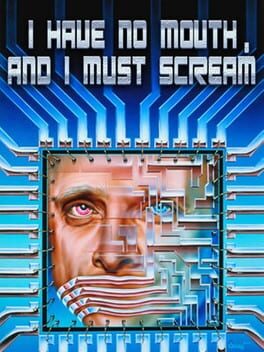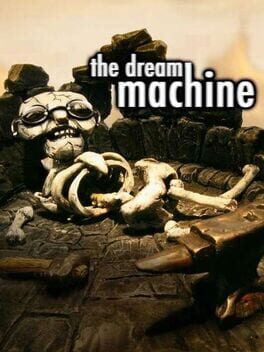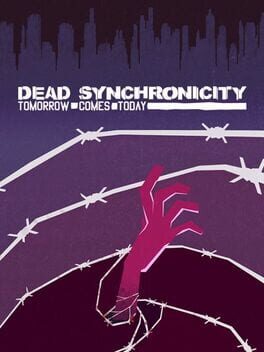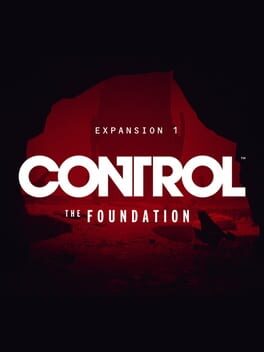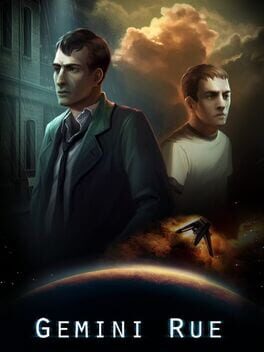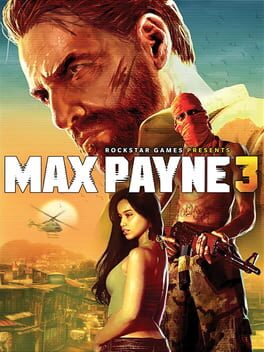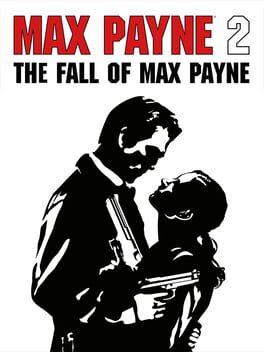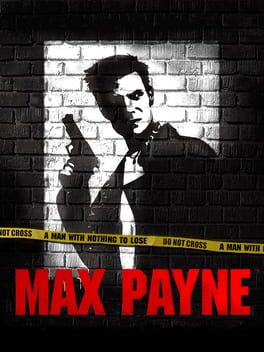szymon
Launching this cult classic, I was expecting to require a lot more outside help during my first playthrough, which is often the case with adventure games from that era. When playing each of the chapters devoted to the main five characters I found the puzzles to be manageable, even if sometimes they veered into the more abstract category. This changed dramatically, however, in the epilogue - I honestly have no idea how anyone could achieve the ‘good’ ending without following a guide or prior knowledge of the game. The scope of that final chapter and the number of items in the inventory and interactable objects certainly don’t help. This should’ve been streamlined, or at least explained better to give players a real chance to arrive at the desired ending by themselves.
What I found a bit puzzling was the inclusion of a spiritual barometer of sorts. When the character we’re in charge of does something considered positive, e.g. helps an NPC, then it flashes green and the face of the character starts showing a faint smile. I understand that it is supposed to work in line with the overall theme of the game, which is facing one’s guilt/fear, but I’m not sure how some instances of relevant behaviors work into that. Let’s say a character is being kept hungry by AM - if they find something to eat, it also improves their situation and the meter starts glowing green. Perhaps I’m missing something, but I just failed to see consistency in the actions that were assigned meaning when pushing the characters into their best ending, which would see them face their guilty conscience.
The biggest problem I have with the game is its selection of characters and their ‘faults’. I struggle to understand why on the one hand, you’d include a literal Nazi scientist (who sold out his parents to Gestapo, no less) conducting experiments on prisoners of concentration camps and a war criminal who also might be a cannibal, and on the other hand a woman whose only fault was being raped or a man blaming himself for committing his spouse to a mental institution. I figure the common factor between all those characters is a sense of guilt that they need to overcome to finally find peace within themselves, but I found it hard to sympathize with the first kind of characters described above. Plus, they are all being subjected to unspeakable tortures by AM, regardless of whether or not they are actually guilty of anything. Those feelings were taking me out of the game at times, and what didn’t help was that some of the more mature topics, like the aforementioned rape or concentration camp, were handled poorly and without the necessary delicacy or nuance. Ellen's story especially feels out of date and in poor taste. The game also doesn’t skip out on gory details in most scenarios, which to me reads like a juvenile attempt at edginess rather than trying to comment on some important topics in a mature way. It does get slightly better in the final chapter, which leans slightly into some Freudian concepts and proves that humanity’s creations will always bear the flaws of its creators.
What I need to admit is that visually the game is still quite impressive, mostly due to the sheer variety of the levels. Each character finds themselves in a completely unique setting and each time I was eager to progress to see what else the game had to offer. The pixelart holds up really well, and it still proves to be the best way to preserve a game (unlike e.g. early 3D graphics from that time which often look hideous today). The music and voice acting are solid (even if some lines are janky), with the author of the short story Harlan Ellison stepping in to voice AM, the villain. I also appreciate the multitude of endings (not that many if you think about it, but still it’s a nice touch to have some variety in the outcomes in a point’n’click).
What I found a bit puzzling was the inclusion of a spiritual barometer of sorts. When the character we’re in charge of does something considered positive, e.g. helps an NPC, then it flashes green and the face of the character starts showing a faint smile. I understand that it is supposed to work in line with the overall theme of the game, which is facing one’s guilt/fear, but I’m not sure how some instances of relevant behaviors work into that. Let’s say a character is being kept hungry by AM - if they find something to eat, it also improves their situation and the meter starts glowing green. Perhaps I’m missing something, but I just failed to see consistency in the actions that were assigned meaning when pushing the characters into their best ending, which would see them face their guilty conscience.
The biggest problem I have with the game is its selection of characters and their ‘faults’. I struggle to understand why on the one hand, you’d include a literal Nazi scientist (who sold out his parents to Gestapo, no less) conducting experiments on prisoners of concentration camps and a war criminal who also might be a cannibal, and on the other hand a woman whose only fault was being raped or a man blaming himself for committing his spouse to a mental institution. I figure the common factor between all those characters is a sense of guilt that they need to overcome to finally find peace within themselves, but I found it hard to sympathize with the first kind of characters described above. Plus, they are all being subjected to unspeakable tortures by AM, regardless of whether or not they are actually guilty of anything. Those feelings were taking me out of the game at times, and what didn’t help was that some of the more mature topics, like the aforementioned rape or concentration camp, were handled poorly and without the necessary delicacy or nuance. Ellen's story especially feels out of date and in poor taste. The game also doesn’t skip out on gory details in most scenarios, which to me reads like a juvenile attempt at edginess rather than trying to comment on some important topics in a mature way. It does get slightly better in the final chapter, which leans slightly into some Freudian concepts and proves that humanity’s creations will always bear the flaws of its creators.
What I need to admit is that visually the game is still quite impressive, mostly due to the sheer variety of the levels. Each character finds themselves in a completely unique setting and each time I was eager to progress to see what else the game had to offer. The pixelart holds up really well, and it still proves to be the best way to preserve a game (unlike e.g. early 3D graphics from that time which often look hideous today). The music and voice acting are solid (even if some lines are janky), with the author of the short story Harlan Ellison stepping in to voice AM, the villain. I also appreciate the multitude of endings (not that many if you think about it, but still it’s a nice touch to have some variety in the outcomes in a point’n’click).
This is the kind of game that is pretty much just pure joy. I was smiling throughout most of it simply because the levels and power ups are so wonderfully inventive I was being surprised constantly until the very end. The difficulty level is just right, meaning that most levels took me 2-3 attempts to collect every collectable, especially in the latter stages of the game. Sure, there were a handful of pretty banal levels that didn’t require too much effort and a couple that I found frustratingly difficult (thinkinking mostly of the level unlocked after beating the story and collecting all collectables - yeah, that one was tough). But the impeccable controls and the aforementioned level design kept me entertained regardless. If I had to nitpick I’d say that the search party levels felt superfluous. Also, perhaps there weren’t enough opportunities to use the full array of available power ups - I mostly stuck to 3 that I found worked best for me and managed to get through the game with relatively no issues. Oh, and the rhythm sections were fantastic, please include more of them in the next installment!
2012
‘The Dream Machine’ is a game whose concept is built around entering people’s dreams and exploring their unconscious. The selling point of this particular point and click is its artstyle - environments and characters are physical objects created by artists using materials such as clay and cardboard. It is reminiscent of adventure titles like ‘The Neverhood’ or ‘Armikrog’, although it is distinct enough to stand on its own and be instantly recognizable. The visual side is also the strongest point of the title - the levels are wonderfully realized with the enchanted forest being the absolute highlight, both in its scope and detail. The character models are equally impressive - I can’t really think of anything similar in the gaming world. There is one, quite significant, chunk of the game that takes place in a level looking like taken out of the movie ‘Cube’ which left me unimpressed, but other than that the presentation is very strong and often I found myself looking around the levels, appreciating all the little details the artists left for the player to enjoy.
Does the story support the impressive visuals? Mostly yes. The plot is chiefly a pretext to throw Victor, the protagonist, into other people’s dreams, but what kept me engaged until the very end was the wide array of well-written NPCs that Victor encounters during the 14 or so hours it takes to finish all six chapters, my favorite being a knight who doesn’t realize he died centuries ago. I was really surprised at how dark the game gets as it progresses, with flashbacks into Edie’s past evoking the strongest emotional response. This didn’t prepare for the ending, however, which features perhaps the most disturbing scene I’ve ever encountered in a video game. I did feel at times like the final chapter was rushed and too much content was squeezed into too few levels and I definitely would’ve liked more space to fully process the last hour which was very abstract and filled with inventive metaphors.
Another thing that all point and click adventures have in common is the inclusion of puzzles. And in ‘The Dream Machine’ they’re quite uneven. There were a number of times where I felt like they were too obtuse and required scanning every single pixel on a given level. Some of them required re-learning how to use specific objects - an example I can give without hopefully spoiling too much is when finding a book for the 4th time or so the game expects the player to figure out he’s capable of tearing a page out of the book, while in the previous instances of using this type of object it was never possible. Also, some puzzles - especially towards the end of the game, where a larger portion of the game opens up - required quite a bit of going back and forward to get very little done. At one point Victor receives an object that he can use to manipulate his size - this was fun at first, but got tiresome very quickly and I was looking for a way around the level where I could use it as little as possible.
I need to mention a couple of technical problems that the game unfortunately isn’t devoid of. I’ve encountered two permanently corrupted save files (out of ten slots available) which is quite a serious error in any game, however the autosave feature in ‘The Dream Machine’ is quite generous and seemed to be working fine. The game also had problems running smoothly on my Steam Deck - the animations would sometimes freeze for a moment before continuing, the dialogue appearing on screen (the game isn’t voiced) also would appear and disappear in too few frames making it less fluid than it should’ve been.
Does the story support the impressive visuals? Mostly yes. The plot is chiefly a pretext to throw Victor, the protagonist, into other people’s dreams, but what kept me engaged until the very end was the wide array of well-written NPCs that Victor encounters during the 14 or so hours it takes to finish all six chapters, my favorite being a knight who doesn’t realize he died centuries ago. I was really surprised at how dark the game gets as it progresses, with flashbacks into Edie’s past evoking the strongest emotional response. This didn’t prepare for the ending, however, which features perhaps the most disturbing scene I’ve ever encountered in a video game. I did feel at times like the final chapter was rushed and too much content was squeezed into too few levels and I definitely would’ve liked more space to fully process the last hour which was very abstract and filled with inventive metaphors.
Another thing that all point and click adventures have in common is the inclusion of puzzles. And in ‘The Dream Machine’ they’re quite uneven. There were a number of times where I felt like they were too obtuse and required scanning every single pixel on a given level. Some of them required re-learning how to use specific objects - an example I can give without hopefully spoiling too much is when finding a book for the 4th time or so the game expects the player to figure out he’s capable of tearing a page out of the book, while in the previous instances of using this type of object it was never possible. Also, some puzzles - especially towards the end of the game, where a larger portion of the game opens up - required quite a bit of going back and forward to get very little done. At one point Victor receives an object that he can use to manipulate his size - this was fun at first, but got tiresome very quickly and I was looking for a way around the level where I could use it as little as possible.
I need to mention a couple of technical problems that the game unfortunately isn’t devoid of. I’ve encountered two permanently corrupted save files (out of ten slots available) which is quite a serious error in any game, however the autosave feature in ‘The Dream Machine’ is quite generous and seemed to be working fine. The game also had problems running smoothly on my Steam Deck - the animations would sometimes freeze for a moment before continuing, the dialogue appearing on screen (the game isn’t voiced) also would appear and disappear in too few frames making it less fluid than it should’ve been.
'Dead Synchronicity' feels like a prologue to a much bigger story that we never got to see as the project was seemingly abandoned quickly after original release. The game ends on a cliffhanger that promises a radical turn in the setting that looks a lot more interesting than the actual game. 'Dead Synchronicity' hardly includes anything unusual when it comes to the post-apocalyptic genre: disintegration of societal structures, the cost of human life brought down to 0, survival of the fittest with the meek kept in check and taken advantage of in various ways, authorities withholding information from the citizens to keep them obedient, or the toll it takes on an individual to survive in a hostile world.
The setting includes some supernatural elements which could make this particular story stand out, however in stories about the end times I'm always more interested in how people manage to 'stay human' in such adverse conditions rather than the causes for the situation. For my liking the game focuses too much on the latter, and the information we're given about the Great Wave isn't too captivating either.
The game is extremely dark with several scenes that I thought were unnecessary - whenever you create a piece of entertainment with things like refugee camps, contagious deadly diseases or state brutality, so issues that are still causing unrest in many places, you need to be very careful in the depiction of those and I felt like 'Dead Synchronicity' lacked the sensitivity required to include them successfully.
The gameplay is pretty standard - it's a point and click adventure and most time is spent solving puzzles to get to the next area. There were a few head-scratchers that I finally solved by using every object in my inventory on every interactable piece in the background - a tactic often used in this type of game, although some solutions were so absurd they felt out of place in a game so serious in tone. I was also surprised at how underused the 'flashback' mechanic was. Throughout the game the protagonist regularly experiences flashbacks that seemingly transport him in time, but it is used only once as part of a puzzle - this could've been expanded on significantly to make the gameplay more varied.
Voice acting is highly inconsistent, with a few characters particularly strong in that regard (e.g. the protagonist Michael), while other almost comically bad (e.g. Rod and some of the children). It doesn't help that a lot of the dialogue is written in an expository manner that potentially makes it more difficult to sound natural.
One last thing - on a number of occasions the choice of music was simply horrible. I'm convinced it's a bug, because I refuse to believe that someone would purposefully deflate several tense scenes by placing some generic rock in the background.
The setting includes some supernatural elements which could make this particular story stand out, however in stories about the end times I'm always more interested in how people manage to 'stay human' in such adverse conditions rather than the causes for the situation. For my liking the game focuses too much on the latter, and the information we're given about the Great Wave isn't too captivating either.
The game is extremely dark with several scenes that I thought were unnecessary - whenever you create a piece of entertainment with things like refugee camps, contagious deadly diseases or state brutality, so issues that are still causing unrest in many places, you need to be very careful in the depiction of those and I felt like 'Dead Synchronicity' lacked the sensitivity required to include them successfully.
The gameplay is pretty standard - it's a point and click adventure and most time is spent solving puzzles to get to the next area. There were a few head-scratchers that I finally solved by using every object in my inventory on every interactable piece in the background - a tactic often used in this type of game, although some solutions were so absurd they felt out of place in a game so serious in tone. I was also surprised at how underused the 'flashback' mechanic was. Throughout the game the protagonist regularly experiences flashbacks that seemingly transport him in time, but it is used only once as part of a puzzle - this could've been expanded on significantly to make the gameplay more varied.
Voice acting is highly inconsistent, with a few characters particularly strong in that regard (e.g. the protagonist Michael), while other almost comically bad (e.g. Rod and some of the children). It doesn't help that a lot of the dialogue is written in an expository manner that potentially makes it more difficult to sound natural.
One last thing - on a number of occasions the choice of music was simply horrible. I'm convinced it's a bug, because I refuse to believe that someone would purposefully deflate several tense scenes by placing some generic rock in the background.
2020
2019
This review contains spoilers
'Control' in a lot of ways reminds me of a Christopher Nolan movie. A large, complex, multilayered concept paired with a sleek visual style, a plot that feels like an afterthought and characters that exist only to serve up exposition. And just like with Nolan's movies, I found it mostly bland and boring.
After a couple of games where the gameplay was, to put it lightly, less than satisfactory (looking at you two, 'Alan Wake' and 'Quantum Break'), Remedy finally managed to create a fun combat system that is based on the protagonist's supernatural abilities. After over 20 hours with the game (including DLCs) I was still very much enjoying throwing at the enemies the wide array of objects at Jesse's disposal. Equally satisfying was levitating over the battlefield and taking down the enemies with the game's equivalent of a sniper rifle. The collection of guns available is rather standard, but the shooting mechanic is serviceable. It's a shame, then, that most combat scenarios and enemies are uninspired and quickly feel like a copy of previous encounters. I think the game could've really used more variety in its enemies including boss battles, which are scarce and not memorable at all.
The game's clean, corporate-like visual style wears off pretty quickly, although there are some exceptions, with the most notable being the Ashtray Maze which is at the same time the most thrilling level in the whole game. Many times I did feel, however, like I'd been wondering the same corridors/rooms for long periods of time and that feeling was only exacerbated by the game's terrible navigation system, where the map is actually detrimental to the experience.
I think Remedy's writers are very talented when it comes to writing deep, complex lore, however in this case I found myself lost among all the abstract themes, entities, planes, etc. I'm well aware that to many people this will be the strongest part of the game, analyzing every little detail (and there's definitely a lot to be analyzed, including an absurd number of collectible notes) and figuring out the connections between 'Control' and Remedy's previous games. Personally, I found it to be too much and along the way I lost interest, even though I was picking up and reading every letter and memo I found for the first half of the game or so.
In contrast to its deep lore, the game's actual plot is relatively straightforward. The writers made the right call by withholding Jesse's true motivations for a considerable amount of time, because when they are finally revealed they turn out to be quite...plain? It doesn't help that Jesse's brother makes an uninspired quasi-villain and every single other character, even though Remedy tried to make them look and sound unique, is nothing more than an exposition tool.
What I did appreciate, however, were the numerous little quests. Figuring out the way to get the desired outcome at the roulette, entering the mirror world, the fridge duty - it's clear that the team had lots of great ideas how to take advantage of the setting which allows for virtually anything (and is also a great starting point for a potential sequel). It's an even greater shame, then, that the majority of the main storyline is a very video gamey chase between MacGuffins and uninspired characters.
After a couple of games where the gameplay was, to put it lightly, less than satisfactory (looking at you two, 'Alan Wake' and 'Quantum Break'), Remedy finally managed to create a fun combat system that is based on the protagonist's supernatural abilities. After over 20 hours with the game (including DLCs) I was still very much enjoying throwing at the enemies the wide array of objects at Jesse's disposal. Equally satisfying was levitating over the battlefield and taking down the enemies with the game's equivalent of a sniper rifle. The collection of guns available is rather standard, but the shooting mechanic is serviceable. It's a shame, then, that most combat scenarios and enemies are uninspired and quickly feel like a copy of previous encounters. I think the game could've really used more variety in its enemies including boss battles, which are scarce and not memorable at all.
The game's clean, corporate-like visual style wears off pretty quickly, although there are some exceptions, with the most notable being the Ashtray Maze which is at the same time the most thrilling level in the whole game. Many times I did feel, however, like I'd been wondering the same corridors/rooms for long periods of time and that feeling was only exacerbated by the game's terrible navigation system, where the map is actually detrimental to the experience.
I think Remedy's writers are very talented when it comes to writing deep, complex lore, however in this case I found myself lost among all the abstract themes, entities, planes, etc. I'm well aware that to many people this will be the strongest part of the game, analyzing every little detail (and there's definitely a lot to be analyzed, including an absurd number of collectible notes) and figuring out the connections between 'Control' and Remedy's previous games. Personally, I found it to be too much and along the way I lost interest, even though I was picking up and reading every letter and memo I found for the first half of the game or so.
In contrast to its deep lore, the game's actual plot is relatively straightforward. The writers made the right call by withholding Jesse's true motivations for a considerable amount of time, because when they are finally revealed they turn out to be quite...plain? It doesn't help that Jesse's brother makes an uninspired quasi-villain and every single other character, even though Remedy tried to make them look and sound unique, is nothing more than an exposition tool.
What I did appreciate, however, were the numerous little quests. Figuring out the way to get the desired outcome at the roulette, entering the mirror world, the fridge duty - it's clear that the team had lots of great ideas how to take advantage of the setting which allows for virtually anything (and is also a great starting point for a potential sequel). It's an even greater shame, then, that the majority of the main storyline is a very video gamey chase between MacGuffins and uninspired characters.
2010
This review contains spoilers
I really shouldn't have enjoyed this game as much as I did. The combat is extremely basic, including awkward dodge mechanic and clunky aiming (you basically aim using your flashlight rather than your gun, making some precision shots, e.g. trying to shoot an exploding barrel next to an enemy that becomes auto-locked when you aim in his general area, extremely difficult). Most level design is equally simple, making the player run in circles around the woods with some copy-paste dilapidated houses and mills that serve as storage for ammo/collectibles. The driving sections are tedious, and whatever fun that can be had while crushing enemies with an SUV is undermined by poor controls that make it almost impossible to actually turn the car. Also, the last chapter is by far the weakest, with the game simply throwing an army of the Taken at you and the final confrontation feels like an afterthought rather than proper climax.
But those problems - very serious ones, don't get me wrong - mostly fade away simply because they're packaged within what might be one of the most immersive, atmospheric environments and gripping stories in video games. Sure, Remedy are stealing whatever they can get away with from Twin Peaks and Stephen King's novels in particular, but - not unlike their two Max Payne games - they do it with so much love for both the original works and the characters of their own creation that I couldn't help but dive headfirst into the story of a writer battling his demons in a small American town. It also helps that the characters are very well written with voice acting strong enough to bring them to life successfully. There are some great set pieces, the definite highlight being defending a farm during a rock concert - even remembering it now brings a smile to my face. I also appreciate that the plot includes enough supernatural twists and unanswered questions to keep me guessing and in effect more invested in the world, while Remedy's later games, e.g. Control, include lore too convoluted and abstract for my taste and they lost my interest quite quickly.
This is a game that I've finished 3 times (I think?) as of now and I am certain that I will be coming back to it regularly in the future to immerse myself in the wonderfully created town of Bright Falls.
But those problems - very serious ones, don't get me wrong - mostly fade away simply because they're packaged within what might be one of the most immersive, atmospheric environments and gripping stories in video games. Sure, Remedy are stealing whatever they can get away with from Twin Peaks and Stephen King's novels in particular, but - not unlike their two Max Payne games - they do it with so much love for both the original works and the characters of their own creation that I couldn't help but dive headfirst into the story of a writer battling his demons in a small American town. It also helps that the characters are very well written with voice acting strong enough to bring them to life successfully. There are some great set pieces, the definite highlight being defending a farm during a rock concert - even remembering it now brings a smile to my face. I also appreciate that the plot includes enough supernatural twists and unanswered questions to keep me guessing and in effect more invested in the world, while Remedy's later games, e.g. Control, include lore too convoluted and abstract for my taste and they lost my interest quite quickly.
This is a game that I've finished 3 times (I think?) as of now and I am certain that I will be coming back to it regularly in the future to immerse myself in the wonderfully created town of Bright Falls.
2011
This review contains spoilers
Man, I really wanted to like this more than I did. And it started off strongly - the art style and characters effectively create an atmosphere similar to the one in Blade Runner, which is the most obvious source of inspiration for 'Gemini Rue'. It's not only superficial, because the game tries - as any good sci-fi - to use its setting as a backdrop to ask some questions about the human condition, although to be perfectly honest I would've liked it to go more in-depth in the exploration of these themes. The characters in general are well established and display clear motivations for their actions, however I think they could've used some more fleshing out as by the end of the game most of them felt a little too one-dimensional. Point & click games have the luxury of not having to bombard the player constantly with new distractions and there were definitely moments in the story where writers could've added some more interactions between the characters (e.g. on the ship) to add some more nuance to them. The locations look great, although further in the game the budgetary constraints become obvious as we end up visiting the same places/seeing the same room, although it didn't bother me too much and I treat it as a nitpick. What did bother me, however, were some elements of the plot - namely the plot twists that felt a little too obvious, hence the revelations were not as impactful as intended. I think the game could've done without the shooting sections because they're a chore and I tried to get them done as quickly as possible. The puzzles were fine as they were usually easy to understand, with the exception of a few instances of pixel hunting required.
2012
This review contains spoilers
Yeah, I don't know about this one. Rockstar writers seem like they were torn between several approaches to Max as a character and the setting as a whole. On the one hand, they wanted to add to his character new layers of self-awareness and weight given his previous failures as well as an overwhelming feeling of exhaustion, where he's pretty much given up and given in to his alcoholism. On the other, they fill his mouth with so many cheesy one-liners that I got could barely keep up rolling my eyes at them. The writers tried to include some commentary about the excesses of the police force, impunity of the officers as well as the overwhelming power wielded by the richest citizens that are all exacerbated by the poverty in the region. Then, those same writers develop a moronic subplot involving organ harvesting that almost undoes everything good mentioned in the previous sentence. Another example: game depicts in horrifying detail the abuse experienced by the poorest Brazilians from said police officers. At the same time, it revels in showing every little gory detail when Max finishes a shootout by unloading a full clip into an enemy's head. What is the point of this?
Moving on to the gameplay, it is both incredibly fun and incredibly frustrating. Fun, because Max expanded his move set which made the combat more fluid (even if I disagree with the decision to include cover-based shooting, I tried to omit that whenever I could). Frustrating, because often we are only allowed to actually play the game in short bursts. The number of cutscenes is overwhelming and there are numerous instances of the game allowing you to control Max for 30 seconds or so and then skipping to another cutscene. This completely destroys any feeling of momentum that can be built during one of the longer combat sequences, e.g. the famous airport shootout. Sure, the music's great, the graphics hold up very well over a decade later, some of the animations are still impressive. But this feels more like Rockstar wanting to keep the old fans happy and at the same time looking for a new direction asking "do you like this perhaps?" and in the end delivering a product that feels disjointed.
Moving on to the gameplay, it is both incredibly fun and incredibly frustrating. Fun, because Max expanded his move set which made the combat more fluid (even if I disagree with the decision to include cover-based shooting, I tried to omit that whenever I could). Frustrating, because often we are only allowed to actually play the game in short bursts. The number of cutscenes is overwhelming and there are numerous instances of the game allowing you to control Max for 30 seconds or so and then skipping to another cutscene. This completely destroys any feeling of momentum that can be built during one of the longer combat sequences, e.g. the famous airport shootout. Sure, the music's great, the graphics hold up very well over a decade later, some of the animations are still impressive. But this feels more like Rockstar wanting to keep the old fans happy and at the same time looking for a new direction asking "do you like this perhaps?" and in the end delivering a product that feels disjointed.
This review contains spoilers
I remember loving this game as a kid, and I still enjoy large parts of it, but upon replaying it now it's clear to me that as an overall experience it doesn't reach the heights of its predecessor. The gunplay was perfected, that's clear - although on the default difficulty it seems too easy now, as if between games number 1 and 2 Max turned into the Punisher mowing down dozens of goons without breaking a sweat. I enjoy the gameplay of 2 better than 1, however the gameplay (and difficulty) of 1 made more sense within the story and setting. Replaying the game recently I was also shocked at how many levels are dilapidated/unfinished interiors or building sites that seem like an excuse to not produce too many assets. And what might be the most interesting level in the franchise - the funhouse - is used three times, diminishing its initial impact massively. There are some really great moments, my favorite being running around Max's apartment complex and interacting with his neighbors, or employing the help of some unsuspecting mobsters. I also appreciated being able to play several levels as Mona, even if that didn't bring any meaningful change to the gameplay. But these truly fun-filled moments are sparse, even if the game is shockingly short at less than 5 hours. I didn't mind the escort missions too much, and the one with Vinnie Gognitti was actually quite enjoyable due to the character's cartoonish predicament. But the part that I was most disappointed by was the story. The love story between Mona and Max fell completely flat, and the game doesn't try too hard to invest you in that either - you're supposed to care about Mona because for some reason Max falls for her and that's it. I would've loved some more characterization, to see a bit more of Mona's personality and how she interacts with Max outside of helping each other survive among a sea of mobsters. I understand that they share the trauma of losing their loved ones, but to me that fact by itself wasn't enough to pull me in her story. The conspiracy angle revolves mostly around the same characters as in the previous game and rather than feeling excited or surprised by the revelations included in here, I felt like those were some lazy decisions on behalf of writers who couldn't come up with some interesting new story/characters.
2001
This review contains spoilers
It's nothing short of crazy that this is the game that holds up best out of all 3 in the franchise - both a testament to its quality and to the disappointment brought on by the next two entries. The gameplay loop is rather simple, although bullet time has got to be one of the most satisfying action game mechanics to date and even in its infancy here it brings tons of joy. The plot is built almost exclusively around well-known noir/gangster movie cliches (intentionally so), however Remedy managed to pull me in despite pooling seemingly contrasting parts (Italian mobsters, femme fatales and crooked cops paired up with government conspiracies, super soldiers, satanists and secret societies running the world from behind the scenes). I think it works primarily because the writers treat the character of Max Payne seriously. I don't mean that there's no humor in the story - or some famous breaking of the fourth wall, for that matter - but despite being a total cliche, a New York cop in too deep with the city's underbelly trying to avenge his loved ones, the writers obviously have tons of sympathy for him. I also can't help but smile looking at the amateurish comic book panels (especially knowing who the people in the photos are). Not unlike many B movies that the game tries to emulate, the low budget feel adds a lot of charm to the experience. There are some obvious weak spots - the most glaring ones being the 'platforming' sections during Max's nightmarish flashbacks - but they don't spoil the fun for too long. Oh, and this is by far the hardest Max Payne game on the default difficulty level - however I see it as an advantage, where the feeling of being outnumbered enriches the immersion and having to use Max's one exceptional ability forces the player to strategize, even if it meant replaying the same room a number of times to finally get it right.
